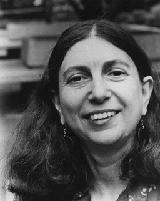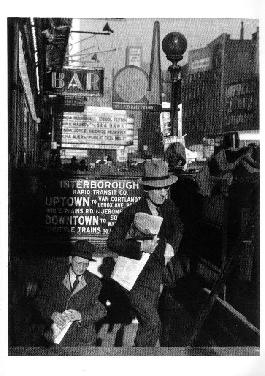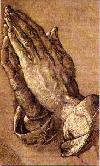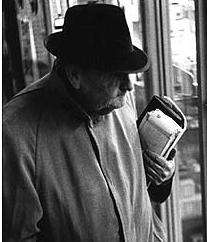
Selected poems
and
Biographical introduction.
 |
Selected poems |
| In
Memoriam: Enid Jacobs Dame passed away Christmas day,
2003 In her memory, a poem: "Elegy for Enid" by Dorian Borsella |
 |
Enid Jacobs Dame
was a poet and college instructor. She lived in New York. Enid has published two volumes of poetry, "Anything You Don't See" and "Stone Shekhina." She has contributed numerous poems to other collections. Enid
also was a Lilith scholar. Lilith is the mythological first wife of Adam and the feminine Dark Side of the Divine. Enid and her husband, the poet Donald Lev, have published a poetry magazine, "Home Planet News," for over 20 years. |
| Enid had keen observational powers to the subtle nuances which comprise the fabric of daily human existence. The smallest detail of any life should never be decried as mundane. Hopefully this selection of poems of Enid Jacobs Dame will be inspirational and thought-provoking to you as they have been to many other readers. |
|
|
Lilith kicked myself out of paradise left a hole in the morning no note no goodbye was patient and hairy he cared for the animals worked late at night planting vegetables under the moon sometimes he'd hold me our long hair tangled he kept me from rolling off the planet |
| it was always safe there but safety wasn't enough. I kept nagging pointing out flaws in his logic he carried a god around in his pocket consulted it like a watch or an almanac it always proved I was wrong two against one isn't fair! I cried and stormed out of Eden into history: the Middle Ages were sort of fun they called me a witch I kept dropping in and out of people's sexual fantasies now I work in New Jersey take art lessons live with a cabdriver he says; baby what I like about you is your sense of humor sometimes I cry in the bathroom remembering Eden and the man and the god |
|
|
RIDING THE D-TRAIN Notice the rooftops, the wormeaten Brooklyn buildings. Houses crawl by, each with its private legend. In one, a mother is punishing her child slowly, with great enjoyment. In one, a daughter is writing a novel she can't show to anyone. |
| Notice your fellow riders: the Asian girl chewing a toothpick, the boy drawing trees on his hand, the man in a business suit whose shoes don't match. |
|
|
Everything is important: that thin girl, for instance, in flowered dress, golden high heels. how did her eyes get scarred? Why is that old man crying? Why does that woman carry a cat in her pocketbook? |
| Don't underestimate any of it. Anything you don't see will come back to haunt you. |
 |
Little Prayer The platform smells like smoke. The Q train's late. The day is full of promises and dread, with things to say and things to leave unsaid; with broken webs to mend or re-create. The smaller comforts lift but don't sustain: the cat that soothes, the coffee cup that warms. Oh, God, in both your mail and female forms, I ask for help to pull it off again. I check the things I'll need: keys, schedule, face. I cannot name myself. Can I name you? craftsperson, landsman, poet, Buddhist, Jew? Have you some power to lend? a little grace? This is my little prayer, my subway prayer. Please help me travel well from here to there. |
|
|
| Age has its own smell as the sea does or closets or mildewed sheets or cabbage soup blanketing hallways on blue, blurred afternoons down in the old city. You grope for your eyes, your teeth, your foggy bottles, your album of smells. They are confronting you now with their straight bites and their leather envelopes. Some smell like cleaning fluid. Some smell like nothing at all. You shout, "I will not!" but they have the papers. You curse in the old language their grandparents understood. They are rolling their eyes, they are stamping your passport. It smells of fresh ink. They don't look at your face. You no longer live anywhere. You are free to find your way back to the old city where dirt still grows in the cracks of the populated sidewalks. |
|
|
EVE I protected him back then it wasn't really my affair. It was his garden and his god and I was shocked to see him grovel and sob apologies to a voice I couldn't hear. (The gods I listened to were more than one: I heard them singing in fruits in stars in grasses in water inside of stones; and even now, 5,000 years away from Paradise, I feel them all around me: in the oily ocean, in the grass-cracked sidewalk, in the apple tree that crookedly grows up beside my fire escape on West 100th Street in New York City. My world is full of gods I never mention.) But anyway, back then I saw him fallen and I couldn't stand it so I said the words I knew would make things better. And things were better except we had to leave that place. Now people ask me: Was it like the stories? Were peaches bright as wax fruit? Were berries fat as Christmas decorations? 'And how about that apple? Was it sweet as chocolate or liqueur? Did you feel sinful? Are you sorry? But honestly, I don't remember if it was an apple or an orange or why I thought I wanted to eat it, then. I do remember him his body as firm as fruit flesh what it felt like lying with him in wild mint and lemon grasses what I smelled and tasted when we were lovers. Now we're married. At night we lie beside each other on flowered sheets. His snores are comforting as radiator steam. My body is the only home he hasn't had to leave. 'We never talk about that other time when he lay broken and I protected him. He never will forgive me. |
 |
PRAYERS (for Dorian and Jane) My friends are praying for me at an Anglican convent in Catonsville this weekend. My oldest friend tells me the nun on the phone sounded kind, not at all like the harsh-voiced nuns of her childhood I picture these friends sitting in a well-tended garden, lovely with lilies and roses, beside an ancient stone building, a place of privacy, maintained by private women, serene in their long dresses. |
| I am grateful for my friends' prayers. I like the idea of prayers wehether uttered in out-of-the-way holy places (like the convent in Catonsville); or released in the kitchen, by the gas stove, when the water refuses to boil; or muttered between classes, in the way to the doctor's office, or tossed up to the sky on a snappy Fall day while crossing a bridge above a sky-blue creek; or murmured in traffic jams or whispered at a bedside where someone you care for is having another bad night. Poems are more like prayers than they are like, let's say, stories. A famous man wrote that, but I knew it was true long before I read his words. We offer our poems to the cosmos, trusting that someone is out there: a reader a listener One Who Sees who understands the thought, the plea, the insight, the message, that our words are not unheard. My friends, I offer you this poem, in return for your prayers. |
 |
THE SAD MAN I've always known him, the sad man he lived in a forties movie talked Damon Runyon slang sometimes he lived with his mother, read girlie magazines at night, and hid them |
| when I was very young he gave me a cigar band he was my grandfather at the Jewish Old Age Home I read him newspapers his eyes were dimming once he handed me a penny he thought it was a dime. he was my drugstore boss fat sweet with yellow fingers he hadn't had a woman in twenty years he wanted to feel my breasts I let him |
|
|
He also was: a failed musician unpublished lyric poet blocked writer Trotskyist I always knew his sadness was my fault that's why I meet him comfort him in different cities bodies he's getting older but so am I this story has two endings: one: I divorce the sad man go on vacation get a credit card two: I visit the sad man's room it's hot we're trapped In August I promise to stay with him forever he promises to buy a fan. |
|
Hope you enjoyed this poetry
by Enid Jacobs Dame. ___________________________________________________________________ |
In her memory, a poem: "Elegy for Enid" by Dorian Borsella
It was you, my foundation-friend, who once explained that publishers have no truck with dead poets. Does the poem die when the poet does? Is the poem the poet?
You re-created, riding the G train to Brooklyn, more vividly than the riders knew of themselves, spinning their hopes and dreams and fears and dreads from true seeing.
That November evening with me, full moon magical, two sixty-year-old schoolgirls sipping chamomile tea, snuggled in teddy bear pajamas, we could have passed for six, giggling over school stories. Tea cups and cupcakes and the morphine bottle, your mind starburst-brilliant, your body ruined, metastatic,
You were ever hopeful but I had already dreamed the dream
that you journeyed to meet your mother at the station. |
|
|